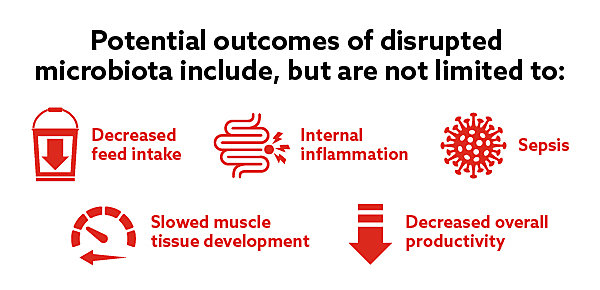An animal's gastrointestinal (GI) tract is critical to its health and wellbeing. It's obvious that, without it, the animal would be unable to absorb nutrients. However, the role of the GI tract extends far beyond this function. Dr. Ryan N. Dilger, University of Illinois Animal Sciences professor, explains, "about 70% of immune cells are associated with the intestines in some way. That's because we have a large surface area with a layer of enterocytes in direct contact with the outside world. So, it makes sense that we have a lot of the immune resources that are centralized there in the intestine." One key to those immune resources is the balance of microbiota in the GI tract.
Benefits of a balanced microbiota
The microbiota is a set of specific microorganisms found within a given environment — such as the GI tract. The microorganisms that make up this microbiota can vary based on several factors including the species, the environment and the diet that's being provided, according to Dilger. While there are changes in these bacteria over time, "good" bacteria provide defense to the animal by:
- Working to reduce harmful intestinal pathogens: The microbiota can help block the attachment and colonization of most invading enteric pathogens including Salmonella and Escherichia coli.
- Improving host nutrition: Without a balanced microbiota, nutrients found in the diet will not be fully broken down and utilized by the body. In addition, the microbiota produces useful metabolic substrates such as vitamins and short-chain fatty acids.
- Bolstering immunity: A beneficial microbial community plays a key role in maintaining physiological homeostasis, altering the immune system, and influencing organ development and metabolism.1
Dilger explains why immunity is so critical, "when an animal is healthy, it takes relatively few resources to maintain the immune system. However, when animals encounter an immune challenge or become sick, immunity becomes the number one priority. While this is absolutely necessary, it comes at the expense of muscle accretion and other performance priorities."
Problems stemming from a disrupted microbiota
If the composition or function of this microbiota becomes disrupted (dysbiosis), it can affect the immunity and overall health of the host animal. Dysbiosis can occur for many reasons, for example, because the animal has been treated with antibiotics. "A depletion of commensal bacteria means that they are not there as part of that first line defense to stop pathogenic bacteria like Salmonella," says Dr. Dilger. This can cause a breakdown of the epithelial barrier and result in inflammation. "Eventually these pathogens may actually get into the bloodstream and cause sepsis," Dilger explains. "So, maintaining these commensal bacteria, or microbiota, serves to help prevent some of these breaches."


